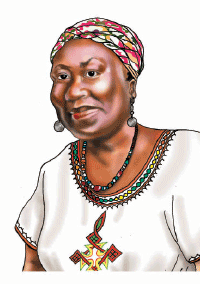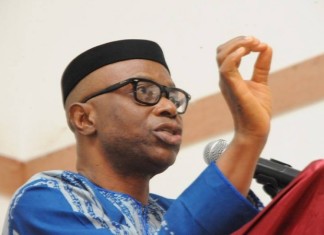Sometime in mid-2012, the newspapers reported that two acclaimed leaders of the Nigerian people, retired Lt. General Theophilus Danjuma and erudite Professor Ben Nwabueze, expressed divergent views as to how the prevailing situation in the country then could be turned around. Nigeria, it seemed evident to all, appeared to be tottering dangerously at the edge of a precipice, about to topple over. Crime had become so rampant and banal, that the country had moved up the ladder to terrorism – given the spate of kidnappings and bomb attacks going on at the time. The nation was being described more and more as a failed state and was then ranked 14th in the world.
Professor Nwabueze felt that only a bloody revolution could put an end to Nigeria’s woes. His message was: “Let the blood flow!” Of course, both the guilty and the innocent would suffer; but, according to the learned professor, “those who survive will pick up the pieces”. General Danjuma, for his part, was vehemently opposed to the idea of a bloody revolution. Rather, he called for effective leadership of the country, so that peace and security could be restored to the land and life would return to normal.
My take then on the differences of opinion which pitted these two eminent Nigerians against each other was to wonder what that difference could be indicative of, given the two personalities involved. That is, what, within the ever enigmatic Nigerian context, would readily pit an erudite academic against a retired General? One wondered then if it could have been based on some stories circulating then (rumours, really) of former army Generals having been allocated oil blocks in the Niger Delta, presumably as a reward of their services to Nigeria. If such rumours were true, then that could indeed explain why any General who had been a beneficiary of such largesse from government would not be particularly warm to the idea of a revolutionary solution to the nation’s problems! Given that there was no proof that General Danjuma was such an individual, that idea remained at the level of mere speculation.
Now, fast-forward to 2016, some four years later, and the plot of Nigeria’s story has significantly thickened. Terrorism has attained previously unimaginable proportions, with Boko Haram sending suicide bombers to markets, motor parks, churches and mosques in the North, abducting hundreds or thousands of people including the world renowned Chibok school girls, and effectively destroying several towns and villages in North East Nigeria and producing tens of thousands of internally-displaced persons (IDPs). As if that was not sufficient preoccupation for the country, kidnapping became the order of the day all over the country and, to crown it all, cattle rustling and violent attacks by AK47-wielding (Fulani) herdsmen are generating “war songs” that could plunge the nation into serious crisis, if not carefully managed.
Well, as for Generals and other highly-placed members of our armed forces, their reputation has sunk to an all-time low. While the matter of some of them having been awarded oil blocks was consigned four years ago to the realm of rumours, now there is practically incontrovertible evidence to prove their corruption. It was a great shock to many, at least those decent people in the land who still had a functioning conscience, to learn as a result of the current administration’s declared war on corruption, that much of the money that was voted to our armed forces to prosecute the fight against Boko Haram was actually diverted into the private accounts of several army and air force top brass! Thus, Nigerian soldiers were being sent to war bare-armed, and it was no wonder that they were fleeing before their better equipped adversaries, Boko Haram. Many of them thus died needlessly, and even their widows had to protest the non-payment of their husband’s entitlements.
What was most shocking in all of this, and which showed the military leaders as totally devoid of conscience, was that they were even bold enough to court marshal those “brave” soldiers who dared to refuse to go and fight against Boko Haram with their bare hands. The thinking of many in the country today is that if President Goodluck Jonathan had been re-elected, the whole charade would have continued and those poor soldiers could even have been executed! Several Generals and Air Vice Marshals are now being prosecuted by the Economic and Financial Crimes Commission (EFCC), and some days ago the army announced the court-marshalling of two Generals.
Nigeria is currently being shaken to her foundations. It is obvious that the so-called “political class” has effectively cornered much of the nation’s wealth and they are not about to give up their ill-gotten advantages easily. The behaviour of the members of the National Assembly testifies to this: their primary interest is their personal benefits (luxurious cars and fat salaries and allowances), not the wellbeing of the people or the institution they are supposed to serve. The lot of the citizens is a hard one: lack of services like electricity, water and good roads, low earning power (a minimum wage of N18,000 in the public service), arrears of salaries being owed and, just a few days ago, an increase in the cost of fuel. The question remains pertinent: what would bring the long-awaited solution to Nigeria’s problems – Professor Nwabueze’s bloody revolution or General Danjuma’s more peaceful approach through effective governance? Time will tell.

- Advertisement -
- Advertisement -
Must Read
Aiyedatiwa extols Mimiko ’s legacy at 70th birthday celebration
Aiyedatiwa extols Mimiko ’s legacy at 70th birthday celebration
By Julius Alabi, Akure
The Governor of...














